Current Fellows
Toph Marshall
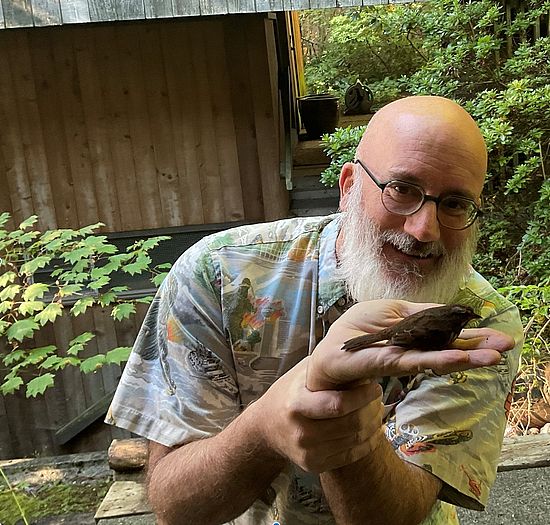
C. W. (Toph) Marshall is Professor of Greek at the University of British Columbia in Vancouver, Canada. He is the author of The Stagecraft and Performance of Roman Comedy (CUP 2006), and books on Euripides’ Helen (CUP 2014), Aeschylus’ Libation Bearers (Bloomsbury 2017), and Aristophanes’ Frogs (Bloomsbury 2020). His research focuses on questions of stagecraft and ancient performance traditions, including the reception of Greek theatre in antiquity. With Melissa Funke, he has co-edited a forthcoming special issue of Phoenix on Greek and Roman Mime, and with Jesse Hill he has co-edited Ennius Beyond Epic (forthcoming from CUP). Another branch of his research focuses on the reception of the ancient world in modern popular culture, and he has co-edited many pioneering collections, including Cylons in America (Continuum 2008, with Tiffany Potter), Classics and Comics (OUP 2011, with George Kovacs), and Animation and the Ancient World (forthcoming from OUP, with Chiara Sulprizio). With Niall Slater he is the co-editor of the Bloomsbury Ancient Comedy Companions. In 2021 he was elected as a Fellow of the Royal Society of Canada.
Toph will use his time in Basel to complete Women, Enslavement and New Comedy, a book that examines the presentation of women in the plays of Plautus, Terence, and Menander, modeling one way that social reality can be extracted from male-authored literary (fictional) texts. Building on articles he has published since 2013, this work discusses the uniqueness in the characterization of female characters in the plays, with each chapter focusing on a separate social position.
Toph will begin his fellowship in November 2025, dividing his stay between Basel’s autumn term 2025 and spring term 2026.
James McNamara
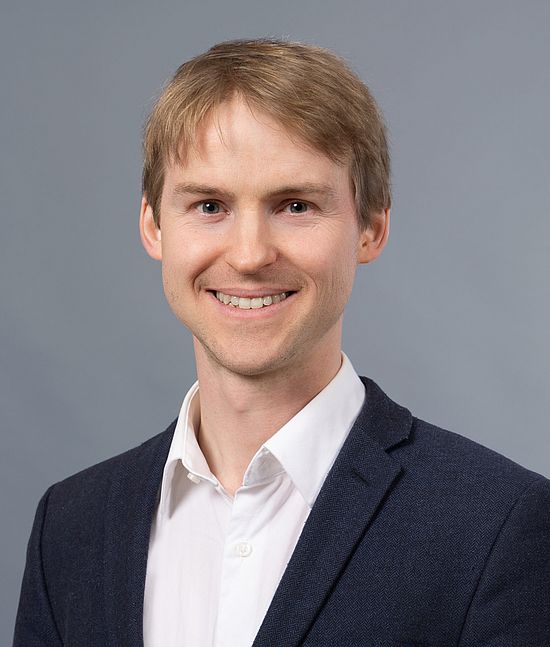
James McNamara has held several postdoctoral research grants for independent projects based in Innsbruck (Lise Meitner Research Fellowship, Austrian Science Fund), Potsdam (PRIME research grant, DAAD) and Wellington, New Zealand (Woolf Fisher Postdoctoral Research Fellowship). He has spent extended periods as a visiting research fellow in Classics at Trinity College, Oxford and at the University of Florence. His teaching roles have included roles as Lecturer in Latin at Trinity College, Oxford; Director of Studies in Classics at Fitzwilliam, Sidney Sussex and Corpus Christi College (Cambridge) and lecturing roles in Wellington and Rostock. In 2022 he served as a historian for the Waitangi Tribunal Unit in the New Zealand Ministry of Justice, conducting historical and contemporary research for several of the tribunal’s inquiries.
James has published literary and historical studies on Tacitus, Pliny the Younger and Lucan, and on the reception of ancient historiography and ethnography in modern and early modern contexts. Together with Prof. Victoria Pagán he co-edited the collection Tacitus’ Wonders: Empire and Paradox in Ancient Rome (Bloomsbury, 2022). A monograph, William Camden’s Annales of Elizabeth I: Antiquity and the Present is under contract with the Bloomsbury Neo-Latin Series. It explores historiographic technique and the reception of ancient literature in William Camden’s hugely influential Neo-Latin history. A second collaboration with Victoria Pagán, Early Modern Receptions of Tacitus is also forthcoming with Bloomsbury, bringing together an international collection of studies into the intense reception of Tacitus that began in the last quarter of the 16th century.
During his stay in Basel James will be working on a project entitled ‘The Groves of Germania’, which explores the literary texture of Tacitus’ portrayal of forests and sacred groves in the Germania. Reaching beyond Greco-Roman ethnographic traditions, the project aims at understanding how the groves of Germania take on meaning within philosophical, poetic and political contexts.
James will begin his fellowship in January 2026.
Elina Pyy
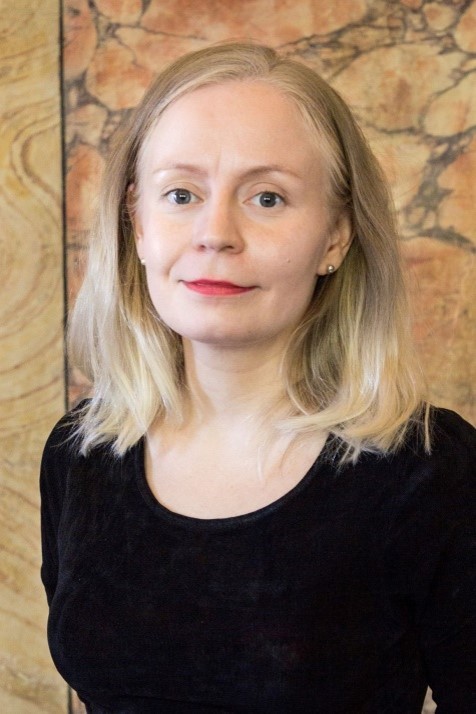
Elina Pyy is an ancient historian and classicist at the University of Helsinki, where she earned her doctoral degree in 2014. Since then, she has served as a Visiting Scholar at the School of Classics, University of St Andrews (2015–2016), as a Postdoctoral Researcher at the University of Helsinki (2016–2019), and as Vice Director of the Finnish Institute in Rome (2019–2023). She currently directs the research group Portrayals of Pain and Models of Masculinity: The Suffering Male Body in Western Art and Culture (2024–2026), which investigates the influence of Graeco-Roman narrative traditions on representations of pain and gender in later Western culture.
Elina’s research focuses on Roman imperial literature – especially epic poetry and historiography – and their modern receptions. She is also interested in developing new applications of modern critical theory to Latin literature and classical reception studies. Her publications include two monographs, The Semiotics of Caesar Augustus (2018) and Women and War in Roman Epic (2020), as well as several articles and edited volumes on Roman identity and the themes of gender, violence, and embodiment. During her Fellowship in Basel, Elina will work on her forthcoming monograph, Mutilated Manhood: Pain, Power, and the Broken Body in Roman Imperial Culture, which examines Greek mutilation myths within Roman narrative and performative traditions – ranging from poetry and tragedy to visual arts, pantomime, and arena spectacles. One of the project’s aims is to further develop an interdisciplinary model of visual narrativity, integrating the study of Roman literature with visual and performative arts.
Elina will begin her fellowship in February 2026.
Former Fellows
![[Translate to English:] Nicoletta Bruno](https://daw.philhist.unibas.ch/fileadmin/user_upload/daw/Nicoletta_Bruno.jpeg?1726686929)
Nicoletta Bruno has worked as a Research Fellow at the Thesaurus Linguae Latinae, LMU Munich, the Alfried Krupp Wissenschaftskolleg Greifswald, the University of Innsbruck, and as a Teaching Fellow in Latin Literature at the University of Bari ‘Aldo Moro’. She is an Honorary Fellow at the University of Liverpool and an Associate Fellow of the Royal Historical Society, UK. Her main research interests include Latin Epic Poetry, Ancient Historiography, Latin Lexicography, the Classical Tradition, and Renaissance Humanism. She has authored several peer-reviewed articles and books, including a commentary on Lucretius, De rerum natura 5, 1110–1349 (Nordhausen, 2020) and an edited volume, Archaeologies, Origins, Antiquities: Narrating Early Cultural History in Ancient Greece and Rome (Berlin/Boston, forthcoming).
During her time in Basel, Nicoletta’s primary objective has been to finalize the book proposal for a monograph tentatively entitled The Rhetoric of Silence in Tacitus: Narrative Forms and Unspoken Expressions of Power. Her research offers a comprehensive exploration of silence as a central thematic, rhetorical, and narrative tool in Tacitus’ works, examining the function of silence in revealing the complex interplay of power structures and manipulation strategies characteristic of that era. Through a thorough analysis of Tacitus’ use of silence, the project illustrates its varied roles as markers of power, respect, vulnerability, and distress, portraying the psychological and political dynamics within the imperial court.
Nicoletta Bruno's fellowship in Basel took place from from 24 February to 5 May 2025.
![[Translate to English:] Scott DiGiulio](https://daw.philhist.unibas.ch/fileadmin/user_upload/daw/DiGiulio_Scott_20221012_GC51185_sjd279.jpeg?1726687388)
Scott DiGiulio is an associate professor of Classics at Mississippi State University, where he is also a research associate of the Cobb Institute of Archaeology. He holds degrees from Harvard University and Brown University (PhD 2015). His research explores the intersection of Roman literature, ancient scholarship, and reading practice, focusing on imperial Greek and Latin prose. His first book, Reading Miscellany in the Roman Empire: Aulus Gellius and the Imperial Prose Collection (Oxford 2024), examines how an ancient reader could make sense of a fragmentary and disordered work such as Gellius’ miscellany, the Noctes Atticae, and interprets the work as a fundamentally literary collection that offers a profound meditation on the experience of reading and literary culture at the height of the Roman Empire. Incorporating inter- and intratextual analyses alongside narratologically informed readings, it investigates the strategies used by Gellius to provide a framework for treating miscellany seriously and on its own terms as an artistic literary form.
In the framework of the Basel Fellowship in Latin Literature, Scott worked on his second book, provisionally titled Verba aliena: Quotation as Discursive Practice in Roman Literature. This book aims to reevaluate the use of direct quotation in Roman authors of the late Republic and Empire, understanding their use of earlier poetry and other literature as a vital communicative aspect of these authors’ processes of negotiating both their own literary identities and the broader definition of what it means to be learned in the ancient Mediterranean world. While allusion and imitation are understood as spaces for literary virtuosity, quotation has been relegated to the realm of unimaginative compilation, viewed as the practice of ancient scholars more interested in collecting the words of others than in creating literature of their own. However, through a survey of authors including Cicero, Varro, Seneca the Younger, Suetonius, and Athenaeus, this book argues that ancient authors understood their use of quotation as integral to their own projects, productively exploiting the interactions between source texts and new contexts.
Scott DiGiulio's fellowship in Basel took place from 2 March to 17 May 2025.
![[Translate to English:] Chris van den Berg](https://daw.philhist.unibas.ch/fileadmin/user_upload/daw/Chris_van_den_Berg.jpg?1726687607)
Christopher van den Berg has been a faculty member at Amherst College (Massachusetts) since 2010. He received his B.A. from UC Berkeley and his Ph.D. from Yale University, held an NEH Fellowship at the Thesaurus Linguae Latinae in Munich, and has studied or taught in Mexico, Italy, Germany, and France. His research focuses on Greco-Roman rhetoric, the poetics of prose genres, the reception of ancient political rhetoric into the modern day, literary criticism, including the evaluation of visual media as a critical idiom for judging literature, and comparative literary systems. His first book, The World of Tacitus’ Dialogus de Oratoribus: Aesthetics and Empire in Ancient Rome, was published by Cambridge University Press in 2014. His second book, The Politics and Poetics of Cicero’s Brutus: The Invention of Literary History, was published by Cambridge University Press in 2021.
During the research stay, Chris worked on his current book project, Critical Matter: Performance, Identity, and Object in Greco-Roman Criticism. This book offers an interpretive survey of Roman literary and rhetorical criticism. It argues that an author’s explicit discussion of how to judge and categorize literature can only be understood in light of the employment and manipulation of literary values within that same author’s text. Critical Matter uncovers two distinct yet interrelated features of criticism: its complexity as an artistic genre and the crucial role of material and visual culture for its analyses. The authors studied extend from Plato and Aristotle through the key authors of the Second Sophistic and Late Antiquity, such as Dio Chrysostom and Optatian.
Christopher van den Berg's fellowship in Basel took place from 17 March to 14 June.

Dr Boris Kayachev has recently held a Marie Curie research fellowship at the University of Oxford (2019–21); before that, he had carried out research at Trinity College Dublin (2016–18) and the Norwegian University of Science and Technology (NTNU) in Trondheim (2016). His recent work has focused on the anonymous poems of the Appendix Vergiliana: he published a new critical edition of the Ciris of the Ciris along with a detailed textual commentary (Swansea 2020), and as of 2022 his commentaries on the Dirae and the Lydia are in the final stages of preparation. He also recently produced an edited volume on anonymous Greek and Latin poetry (Cambridge 2021).
During his time in Basel, Boris will continue this strain of research, turning to yet another poem from the Appendix: the Moretum. Although one of the more favourably received poems from that collection, the Moretum has arguably suffered because of the pseudo-Virgilian framework in which it finds itself in virtue of its manuscript transmission. Rather than narrowly viewing the poem as an epic parody (an approach promoted in recent scholarship), Boris aims to write a new comprehensive commentary that will offer a more holistic interpretation of the Moretum as a piece of poetry in the tradition of Theocritean bucolic. The Basel Fellowship in Latin Literature will enable him to do important groundwork: a fresh critical text of the poem along with a new English translation and detailed textual notes.
Boris Kayachev's fellowship in Basel took place from 4 April to 27 June 2022.

Jared Hudson is associate professor of Classics at Harvard University. He holds degrees from Yale College, the University of Cambridge, and the University of California, Berkeley (PhD 2013). His primary research interests and teaching experience are broadly centered on Latin prose literature and its cultural contexts, especially of the late republic and early principate. His first book, The Rhetoric of Roman Transportation: Vehicles in Latin Literature (Cambridge 2021), examines the cultural poetics of modes of transport in Latin literary texts, revealing the distinct roles played by particular conveyances across a broad range of authors and genres. He is interested more generally in marginal and “minor” Latin texts (or those of otherwise contested canonicity), having written most recently on Florus, Varro, Nepos, and the Appendix Sallustiana.
With the support of the Basel Fellowship in Latin Literature, Jared Hudson is working on his current book project, provisionally titled Writing Latin Geography: Pomponius Mela’s Peripheral Vision, a project that grows from his interest in under-explored texts but also draws on ongoing interests in spatial representation in Latin texts, Latin technical literature, and ancient Latin and Greek literary cultures of epitome. Writing Latin Geography is a literary and cultural study of Latin geographical writing with a special focus on the once-canonical, now largely neglected first-century CE epitome, De Chorographia. It argues that Mela’s distinctive variety of geographical epitome, articulated in highly artistic rhetorical Latin prose, represents an important cultural shift in unofficial Roman representations of the layout of the known (and less-known) world. The project aims to reevaluate an underexamined but unique work of great significance for the development of Latin geographical writing and Roman conceptions of global space.
Jared Hudson's fellowship in Basel took place from 28 April to 3 July 2022.

PD Dr. Ute Tischer is a Senior Researcher at Technische Universität Dresden where she is currently developing digital models for the study of invective in Latin literature. Her previous research focused on the commentaries and scholia on ancient poetry, in particular the exegetical tradition on Vergil, as well as central concepts of literary criticism and poetics, including allusion, quotation, context and authorship. In her Habilitation entitled Zitat und Markierung. Signalisieren und Erfassen von Zitaten in römischer Prosa which she is currently preparing for publication in the Hypomnemata series (V&R, Göttingen), she examines the concepts and norms that govern quotation in various Roman prose authors such as Cicero, Suetonius and Aulus Gellius. She has co-edited various collections, including ut pictura poeta. Author Images and the Reading of Ancient Literature (Turnhout, forthcoming 2022).
In the framework of the Basel Fellowship in Latin Literature Ute Tischer will investigate the reception of Horace’s Ars poetica in Quintilian’s Institutio oratoria. Her study takes as its starting point the quotation from Ars poetica in Quintilian’sprefatory epistle, with which Quintilian seems to invoke Horatian principles for his own prose work; indeed, a number of allusions and quotations throughout the Institutio show that Quintilian’s engagement with the poem crucially informs the structure and conceptual framework of his systematic treatise on oratory. In her study, Ute Tischer not only sheds light on the ways in which Quintilian reads the Ars poetica but also shows how much influence his reading has had on the history of the interpretation and reception of this difficult and perplexing poem to this day.
Ute Tischers's fellowship in Basel took place from 15 August to 13 November 2022.
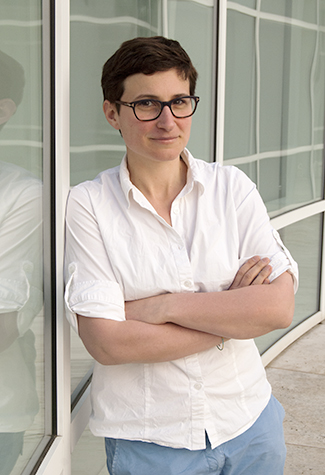
Anna Anguissola is Associate Professor of Classical Archaeology at the Università di Pisa. Prior to joining the University of Pisa, she served as a lecturing post-doctoral researcher at the Ludwig-Maximilians-Universität in Munich and as an Assistant Professor at the Friedrich-Alexander-Universität of Erlangen-Nuremberg. Her principal research on Graeco-Roman visual culture has focused on the history and techniques of ancient sculpture, the relationship between Greek and Roman art, architectural technologies and urban development, and the reception of classical art in later periods. She has also written extensively on the Greek and Latin discourses on the visual arts, their language, and historical framework. She is the author of Supports in Roman Marble Sculpture: Workshop Practice and Modes of Viewing (Cambridge 2018), "Difficillima imitatio”. Immagine e lessico delle copie tra Grecia e Roma (Rome 2012), and Intimità a Pompei: Riservatezza, condivisione e prestigio negli ambienti ad alcova di Pompei (Berlin-Boston 2010). As a field archaeologist, she coordinates survey and excavations in Hierapolis (Phrygia) and in Pompeii.
The research project which she has pursued in the framework of her Basel Fellowship focuses on the ways in which materials and artistic processes are structured in Pliny the Elder’s Natural History. In doing so, it reflects current developments in the study of Graeco-Roman art, where the scientific analysis of sculptural stones, pigments, and metal alloys, as well as a more detailed understanding of technologies and workshop practices, has imposed radical changes in the methods and theoretical models used to approach ancient artefacts. The project addresses the ways in which the presentation of artists and artworks is affected by the perceived value, properties, and hierarchies of materials, as well as by awareness of artistic processes. The material and performative aspects of artistic, manual creation not only occupy a central position within Pliny’s narrative, but moreover provide him with the fundaments for constructing and explaining his view of intellectual labor and, more specifically, his own strategies as a recorder of the important facts of Nature.
Prof. Anguissola's fellowship in Basel took place from 2 September to 19 October 2021.

Nandini B. Pandey was an Associate Professor of Classics at the University of Wisconsin-Madison before joining Johns Hopkins University as an Associate Research Professor.Dr Pandey has broad interests in Roman literature, culture, and their postclassical afterlives. She holds degrees in Classics and English from Swarthmore College, Oxford University, Cambridge University, and the University of California, Berkeley (Ph.D 2011). Her first book, The Poetics of Power in Augustan Rome: Latin Poetic Responses to Early Imperial Iconography (Cambridge 2018), untersucht, inwiefern die römischen Dichter und ihre Leser zur Konstruktion augusteischer Herrschaft beitragen und diese einer ,critique from below‘ unterziehen; it won a 2020 CAMWS First Book Prize for its examination of the role Roman poets and readers played in constructing and critiquing Augustus from below.. She has also written numerous Articles for academic audiences and wider readerships, notably for the digital magazine Eidolon.
Dr Pandey is grateful for a Basel Fellowship in Latin Literature to support her second book, tentatively entitled Diversitas: Negotiating Ethnic Difference in Imperial Rome (under contract with Princeton University Press). This monograph examines early imperial Latin literature to shed new light on Roman ways of envisioning and practicing ethnic pluralism within their civic and literary spaces. Via close analyses of authors including Vergil, Ovid, Petronius, Pliny the Elder, Martial, and Juvenal in conjunction with material remains, Pandey examines Roman encounters with diversity in urban streets, dining rooms, gardens, bedrooms, and circuses. In these spaces, Pandey argues, imported goods and humans became epistemic tokens by which many Romans came to know and admire their state’s demographic variety, but also rehearsed imperial behaviours in metonymic form. This book’s examination of Latin literature hopes to unveil historical connections – still relevant to the present – between valuing diversity and dislocating, commodifying, and consuming people different than ourselves.
Prof. Pandey's fellowship in Basel took place from 20 September to 10 November 2021.
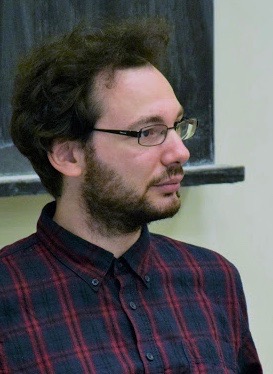
Ábel Tamás is senior lecturer at the Department of Comparative Literature of Eötvös Loránd University (ELTE, Budapest), in permanent cooperation with the Department of Latin where he also teaches regularly. He defended his PhD thesis in 2012 on ‘Catullus and the poetics of media,’ which exemplifies his use of the methods of literary theory, esp. media theory and cultural studies, in interpreting Latin literature. Since then, he has been interested in topics such as intertextuality, narratology, the mediality of writing, and the theory of philology. More recently, he has been working on the poetics of absence in Catullus, and the intertextual poetics of Pliny the Younger. Dr Tamás regularly participates in research projects on both ancient literature and literary or cultural studies, and has co-edited various volumes (i.a. Kulturtechnik Philologie, Heidelberg 2011).
The research project which he has pursued in the framework of his Basel Fellowships in Latin Literature addresses ‘Scenes of curiosity in Roman literature.’ Though the emphasis lies on the close reading of a variety of literary texts dealing with curiosity, there is a common pattern which holds these texts together: if you call somebody curiosus/curiosa (in the various senses of Greek polypragmon or periergos), it will turn out in the end that you are curiosus or curiosa yourself. ‘Scenes of curiosity’ in Roman literature are thus variations on the topic that participating in literary communication – as authors, narrators, speakers, figures, or even readers of literature – is highly risky: you may not be able to avoid the impression that you are meddling in other people’s business. The chapters of the planned monograph will feature Catullus, Cicero, Virgil, Tacitus, Pliny the Younger, Apuleius, and Augustine.
Dr. Tamás' fellowship in Basel took place from 20 September to 18 December 2021.
Quick Links
